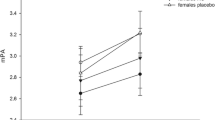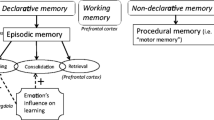Summary
The research investigated the effects of acute ACTH 1–17 administration on plasma cortisol, short-term memory, anxiety state, blood pressure and heart rate. In a double blind crossover design, healthy volunteers were serially evaluated at 5 min, 20 min, 40 min, 60 min after injection of ACTH 1–17 orplacebo in separate sessions. Results show that ACTH 1–17 produced, in addition to an increase in plasma cortisol (5 min · 60 min), significant improvements in short-term memory (5 min), a reduction in anxiety (20 min and 40 min), and an increase in systolic (5 min and 20 min) and diastolic blood pressure (5 min). If confirmed by other studies, the short-term memory effect of ACTH 1–17 at 5 min after i.v. could suggest a central action of the peptide, and confirm the role of HPA axis as a modulator of performance and emotional arousal during acute environmental changes.
Similar content being viewed by others
References
Beatty P. A., Beatty W. W., Bowman E. R., Gilchrist J. C.: The effects of ACTH, adrenalectomy and dexamethasone on the acquisition of avoidance response in rats—Physiol. Behav.5, 939, 1970.
Bohus B.: Effects of hypophyseal peptides on memory functions in rats. In:Adamds G., Szentagothai J. (Eds): The biology of memory. Akademiai Kiado, Budapest, 1971.
Bohus B.: Neuropeptides in brain function and dysfunctions—Int. J. ment. Hlth9, 6, 1981.
Bohus B., Endrocz E.: The influence of pituitary adrenocortical functions in rats on the avoiding conditioned reflex activity—Acta physiol. hung.26, 183, 1965.
Bohus B., Gisfen W. H., De Wied D.: Effects of lysine, vasopressin and ACTH 4–10 on conditioned avoidance behavior of hypophysectomized rats—Neuroendocrinology11, 137, 1973.
Bohus B., Hendricks H. H., van Kolischoten A. A., Krediet T. G.: The effects of ACTH 4–10 on copulatory and sexually motivated approach behavior in the male rat. In:Sandler M., Gessa G. L. (Eds): Sexual behavior: pharmacology and biochemistry. Raven Press, New York, 1975.
Bohus B., Nyakas C., Endroczi E.: Effects of adrenocorticotropic hormone on avoidance behavior of intact and adrenalectomized rats—Int. J. Neuropharmacol.7, 307, 1968.
Branconier R. J., Cole J. O., Gordon G.: ACTH 4–10 in the amelioration of neuropsychological symptomatology, associated with senile brain syndrome—Psychopharmacology61, 161, 1979.
Brunia C. H. M., van Boxtel A.: MSH/ACTH 4–10 and task-induced increase in tendon refiexes and heart rate—Pharmacol, biochem. Behav.9, 615, 1978.
Colpaert F. C., Niemeggers C. J., Jansen P. A., van Ree P. A., De Wied D.: Selective interference of ACTH 4–10 with discriminative responding based on the narcotic cue— Psychonearo-endocrinology3, 203, 1978.
De Wied D.: Inhibitory effects of ACTH and related peptides on extinction of conditioned avoidance behavior—Proc. Soc. exp. Biol. Med.122, 28, 1966.
De Wied D.: Hormonal influences on motivation, learning, memory and psychosis. In:Kriecer D. T., Huges J. C. (Eds): Neuroendocrinology. Sinauer, Sunderland, 1980.
De Wied D.: Influence of anterior pituitary on avoidance learning and escape behavior— Amer. J. Physiol.207, 255, 1964.
De Wied D., Bohus B., Gispen W. H., Urban I.: Hormonal influences on motivational. learning and memory processes. In:Sachar E. J. (Ed.): Hormones, behavior and psychopathology. Raven Press, New York, 1975.
De Wied D., Witter A., Lande S.: Anterior pituitary peptides and avoidance acquisition of hypophysectomized rats. In:De Wied D., Weijnen J. A. (Eds): Pituitary, adrenal and the brain. Elsevier, Amsterdam, 1970.
Endroczi E., Lissak K., Fekete T., De Wied D.: Effects of ACTH on EEG habituation in human volunteers—Progr. Brain Res.32, 254, 1970.
Ferris G. H., Sathananthan G., Gershon S., Clark J.: Cognitive effects of ACTH 4–10 in the elderly—Pharmacol. biochem. Behav.5, 73, 1976.
Flood F. J., Jarkvick M. E., Bennet E. L. V., Orme A. E. V.: Effects of ACTH peptide fragments on memory formation—Pharmacol. biochem. Behav.5 (Suppl. 1), 41, 1976.
Gillard A. V. K., Sanders A. F.: Some effects of ACTH 4–10 on performance during a continuous reaction test—Progr. Brain Res.42, 209, 1975.
Gillard A. W. K., Varey C. E.: Some effects of an ACTH 4–9 fragment analogue (ORG 2766) on human performance—Physiol. Behav.23, 79, 1979.
Gold P. E., Rose R. P., Spanis C. W., Hankins C. W.: Retention deficit for avoidance training in hypophysectomized rats: time dependent enhancement of retention performance with ACTH injections—Hormones Behav.8, 363, 1977.
Greven M. H. D., De Wied D.: The influence of peptides derived from ACTH on performance. Structure activities studies. In:Zimmerman E., Gispen W. H., Marks B. H., De Wied D. (Eds): Drugs effects on neuroregulation. Elsevier, Amsterdam, 1973.
Guillemin R.: Hypothalamic hormones: releasing and inhibiting factors. In:Krieger D. T., Huges J. C. (Eds): Neuroendocrinology. Sinauer, Sunderland, 1980.
Itil T. M., Herman W. M.: Effects of hormones on computer-analyzed human electroencephalogram. In:Lipton M. A., Di Mascio A., Killam K. F. (Eds): Psychopharmacology: a generation of progress. Raven Press, New York, 1978.
Kastin A. J., Miller L. H., Gonzales-Barcena D., Hawley W. D., Dyster Has K., Shally A. V., Valesco de Parra M. L., Valesco M.: Psychophysiology correlates of MSH activity in man—Physiol. Behav.7, 863, 1971.
Kovacs G. L., Telegdy D., Lissak K.: 5-TH and the mediation of pituitary adrenocortical hormones in the extinction of active avoidance behavior—Psychoneuroendocrinology1, 219, 1976.
Livi Bacci R., Leinetti Luparini G.: Statistica applicata alle ricerche cliniche. Uncini Pierucci, Firenze, 1976.
Meyerson B. J., Bohus B.: Effects of ACTH 4–10 on copulatory behavior and response in a test for socio-sexual motivation in the female rat—Pharmacol. Biochem. Behav.5, 539, 1976.
Miller L. H., Kastin A. J., Sandman G. A., Fink M., Van Veen W. J.: Polypeptide influences on motivation, attention, memory and anxiety in man—Pharmacol. biochem. Behav.2, 563, 1974.
Nyakas C., Bohus B., De Wied D.: Effects of ACTH 4–10 on self-stimulation behavior in the rat—Physiol. Behav.24, 759, 1980.
Pigache R. M., Reighter H.: Effects of a peptide related to ACTH on mood in man. In:Rees L. H.,van Wimersma Greidanus Tj. B. (Eds): ACTH and LPH in health and disease. Karger, Basel, 1982.
Prange A. J., Breese G. R., Wilson I. C., Morris R., Lipton M.: Pituitary and suprapituitary hormones: brain behavioral effects. In:Sachar E. J. (Ed.): Topics in psychoneuroendocrinology. Grune-Stratton, New York, 1975.
Reinberg A., Guillemant S., Gatha N. J., Guillemant J., Toujtou Y., Dupont W., Lacoguey M., Bourgeots Ph., Brière L., Fraroulet G., Guillet Ph. Clinical chronopharmacology of ACTH 1–17. I. effects on plasma cortisol and urinary 17-hydroxycorticosteroids—Chronobiologia7, 513–523, 1980.
Rockstrom B., Ehlert T., Lutzenazerger W., Birbaumer R., Fehrn H. L.: Effects of an ACTH 4–9 analogue on human cortical evoked potentials in a constant period of time reaction paradigm—Psychoneuroendocrinology6, 301, 1981.
Sandman C. A., George J., Walker B. B., Nolan J. D., Walker A.: Neuropeptide MSH/ACTH 4–10 enhances attention of the mentally retarded—Pharmacol. biochem. Behav.5, 23, 1976.
Sandman C. A., Nolan D., van Reizan H., Kastin A. J.: Enhancement of attention in man with ACTH/MSH 4–10—Physiol. Behav.15, 427, 1975.
Siegel S.: Statistica non parametrica per le scienze del comportamento. Edizioni OS, Firenze, 1967.
Spielberger C. D., Gorsuch R. L., Lushene R. E.: Manual for the state-trait anxiety inventory. Consulting Psychologist Press, Palo Alto, 1970.
Urban I., De Wied D.: Changes in the excitability in the theta activity generating substrate by ACTH 4–10 in the rat—Exp. Brain Res.24, 325, 1976.
Wolfsdorf G. F., Elbert T., Lutzenberger W., Rockstrom B., Birbaumer N., Fehm H. L.: Effect of an ACTH 4–9 analog on human cortical evoked potential in a two-stimulus reaction time paradigm—Psychoneuroendocrinology6, 311, 1981.
Author information
Authors and Affiliations
Rights and permissions
About this article
Cite this article
Pancheri, P., Biondi, M., Chiaie, R.D. et al. ACTH 1–17 and short-term memory, anxiety, heart rate, blood pressure. La Ricerca Clin. Lab. 14, 221–229 (1984). https://doi.org/10.1007/BF02904976
Issue Date:
DOI: https://doi.org/10.1007/BF02904976




